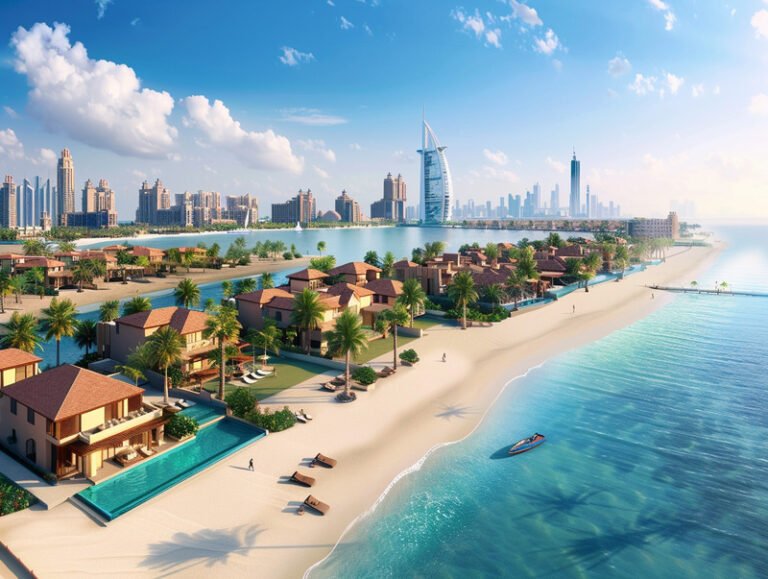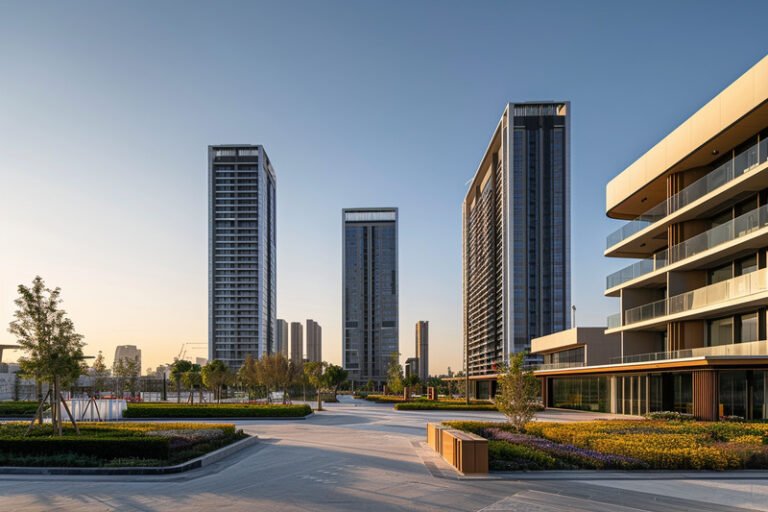Risks Associated With Off-Plan Property Investments

Dubai's off-plan property market offers enticing opportunities for investors seeking high returns and brand-new homes. However, this investment strategy comes with significant risks that can impact your financial goals. From construction delays to market volatility, developer insolvency to quality issues, understanding these potential hazards is crucial before venturing into Dubai's off-plan real estate scene.
Specific risks in Dubai's off-plan property market include:
Construction Delays: Dubai's ambitious projects can face unexpected setbacks, leading to delayed completion dates. This can affect your investment timeline and potential rental income.
Market Fluctuations: Dubai's real estate market is dynamic, and property values can change significantly between purchase and completion. This volatility can impact your investment's profitability.
Let us help you find the perfect property. Contact us to get started.
Developer Insolvency: While rare, developer bankruptcy can occur, potentially leaving investors with unfinished properties and financial losses.
Quality Control Issues: Some completed properties may not meet expected standards, requiring additional investments for improvements or repairs.
Oversupply Concerns: Dubai's continuous development can lead to an oversupply in certain areas, affecting property values and rental demand.
To protect your investment, consider:
Thoroughly researching developers' track records and financial stability.
Reviewing project details, including completion timelines and quality standards.
Seeking legal advice to understand contract terms and buyer protections.
Diversifying your investment portfolio to mitigate risks.
Key Takeaways
Off-plan property investments in Dubai offer exciting opportunities but come with unique risks. The city's dynamic real estate market and ambitious development projects attract global investors. However, understanding the potential pitfalls is crucial for making informed decisions. Dubai's property landscape is influenced by factors such as government initiatives, economic diversification efforts, and global market trends. Investors must navigate these complexities while considering the specific challenges associated with off-plan purchases in this vibrant emirate.
Construction delays are common in Dubai's ambitious projects. Factors like labor shortages, material cost fluctuations, and regulatory changes can impact timelines. This may affect property handover dates and potentially impact investment returns.
Dubai's property market can be volatile. Economic factors, oil prices, and geopolitical events influence property values. Investors may face the risk of price fluctuations between purchase and completion, affecting their investment's profitability.
Developer insolvency is a concern in Dubai's competitive market. Economic downturns or mismanagement can lead to project cancellations or delays. This risk emphasizes the importance of choosing reputable developers with strong financial backing.
Dubai's real estate regulations evolve rapidly. Changes in property laws, visa policies, or ownership rules can impact foreign investors. Staying informed about legal developments is crucial to protect investments and understand rights.
Financing options in Dubai can change quickly. Mortgage regulations, interest rates, and bank policies may shift. Investors should be prepared for potential challenges in securing or maintaining financing for their off-plan purchases.
Construction Delays and Complications
In Dubai's booming real estate market, off-plan property investments can face significant delays and complications during construction. These challenges can disrupt investment timelines and projected returns. Factors contributing to setbacks include material shortages, labor issues, and unexpected site conditions. Developers may underestimate project complexity, leading to extended timelines and increased costs.
Dubai's extreme heat can significantly impact construction progress, especially during summer months. Outdoor work may be limited to cooler hours, slowing overall project completion. Sandstorms can also halt construction activities, causing unexpected delays.
Regulatory hurdles and permit issues specific to Dubai's real estate sector can arise, causing unexpected pauses in construction. These delays not only postpone property completion but may also impact financing arrangements and rental income projections.
Construction complications in Dubai can range from minor defects to major structural issues. Problems with building quality, substandard materials, or poor workmanship may occur. These issues can lead to costly repairs and renovations, reducing potential profits.
It's crucial to research the developer's track record in Dubai and ensure they've contingency plans. Regular site visits and independent inspections are essential to stay informed about the project's progress and identify potential problems early on.
Market Fluctuations
Dubai's real estate market presents unique challenges for off-plan property investors due to its dynamic nature. Price fluctuations and shifting demand patterns create significant risks between purchase and completion. Economic factors like interest rates, employment levels, and foreign investment policies can impact property values and rental yields. Oversupply in certain areas may lead to price drops, potentially resulting in properties worth less than the initial investment.
Market sentiment in Dubai can change rapidly, affecting buyer confidence and demand. New government regulations or urban development plans might alter the desirability of specific locations. Thorough research of market trends and consultation with local real estate experts is crucial before committing to an off-plan purchase.
Consider potential changes in the neighborhood, infrastructure developments, and upcoming projects that could influence property values. Dubai's promised returns on off-plan investments often rely on current market conditions, which may shift by the time of completion.
The emirate's real estate landscape is influenced by factors such as tourism, expo events, and international business trends. Stay informed about Dubai's economic diversification efforts and how they might impact different property sectors and locations.
Developer Insolvency
Developer insolvency is a significant risk in Dubai's off-plan property market. When purchasing an off-plan property, investors rely on the developer's ability to complete the project. If a developer becomes insolvent, the investment could be at risk. Construction may stop indefinitely, leaving buyers with incomplete properties and potential financial losses.
In Dubai, where off-plan investments are common, understanding and mitigating this risk is crucial for investors.
To protect against developer insolvency in Dubai, thorough research is essential. Investigate the developer's financial stability and track record of successful project completions. Look for developers with strong financial backing and a solid reputation in the Dubai real estate market.
Consider purchasing insurance specifically designed for off-plan investments in Dubai. This can provide some protection against developer insolvency and other related risks.
Seek legal advice from experts familiar with Dubai's real estate laws. They can help you understand your rights and potential recourse in case of developer insolvency.
Stay informed about Dubai's real estate market conditions and any regulatory changes that might affect off-plan investments. This knowledge can help you make more informed decisions and spot potential red flags.
Quality Control Issues
Quality control issues can significantly impact off-plan property investments in Dubai, potentially resulting in subpar finished products that fail to meet expectations or local building standards. When purchasing off-plan, buyers rely on developers' promises to deliver high-quality homes. However, without proper oversight, the final product may fall short of expectations.
Common problems include poor workmanship, use of substandard materials, or deviations from agreed-upon specifications. These issues can range from minor cosmetic defects to major structural problems that compromise the property's safety and value.
To protect your investment, thoroughly research the developer's track record and reputation in Dubai's real estate market. Request detailed specifications and finishes in writing, ensuring they're included in your contract.
Consider hiring an independent inspector familiar with Dubai's building regulations to assess the property during construction and upon completion. This step can help identify potential issues early on.
If you discover quality issues, document them meticulously and address them with the developer promptly. Be prepared to seek legal recourse if necessary, as quality control problems can significantly impact your investment's long-term value and livability in Dubai.
Legal and Regulatory Challenges
Legal and regulatory challenges are significant considerations for off-plan property investors in Dubai. Navigating the intricate laws and regulations governing real estate transactions in the UAE can be complex. Investors must understand escrow account requirements, property registration procedures, and contractual obligations between developers and buyers. Strict adherence to Dubai's Real Estate Regulatory Agency (RERA) guidelines is crucial.
Potential risks include project delays or cancellations due to regulatory non-compliance, as well as legal disputes with developers over construction defects, delayed handovers, or changes in project specifications.
Dubai's property laws require careful attention to escrow account management. Developers must deposit funds into regulated accounts, ensuring financial transparency and protecting buyers' interests. Investors should verify that their chosen project complies with these requirements to minimize financial risks.
Property registration in Dubai involves specific procedures that investors must follow. Understanding the steps and documentation required for registering off-plan properties is essential to secure ownership rights and avoid future complications.
Legal disputes with developers can arise from various issues. Investors should thoroughly review contracts and consider seeking legal advice to protect their interests. Familiarizing oneself with Dubai's legal system and dispute resolution processes can help mitigate potential challenges.
Financing Risks
Off-plan real estate investments in Dubai come with several financing risks that can impact returns or jeopardize the entire investment. Interest rate fluctuations during construction may lead to higher mortgage payments upon completion.
Currency exchange rate volatility is a concern for international investors, potentially eroding profits or increasing costs.
Changes in lending policies could make securing mortgages more difficult when the property is ready. Property value depreciation might result in negative equity.
Developer insolvency poses a risk of losing deposits and being left with an unfinished property.
Thorough research of the developer's financial stability and track record is crucial before committing to an off-plan investment in Dubai. It's important to consider the potential for tightened bank requirements for mortgage approvals, which could affect funding availability.
Dubai's real estate market can be volatile, and property values may fluctuate. Investors should be prepared for possible market downturns that could impact their investment's value.
The risk of project delays is significant in Dubai's construction sector. This can lead to extended financing periods and increased costs for investors.
Conclusion
Understanding the risks of off-plan property investments in Dubai is crucial for potential investors. While these opportunities can offer attractive returns, they come with significant challenges. Construction delays, market fluctuations, and developer reliability are key concerns. Dubai's dynamic real estate landscape adds complexity, with regulatory changes and economic factors influencing outcomes.
Legal considerations, including contract terms and ownership rights, require careful attention. Potential volatility in property values and rental yields should also be factored into decision-making.
Thorough research and due diligence are essential before committing to any off-plan investment in Dubai. Analyze the developer's track record, project feasibility, and market trends. Consult with local real estate experts and legal professionals to navigate Dubai's specific regulations and practices.
Consider the location, infrastructure plans, and potential for future development in the area. Evaluate the project's completion timeline and potential for delays, which can impact your investment returns.
Assess your financial capacity and risk tolerance. Off-plan investments often require significant upfront payments and may tie up capital for extended periods. Ensure you have a clear exit strategy and contingency plans.
Stay informed about Dubai's economic outlook and real estate market conditions. Government initiatives and global events can significantly influence property values and demand in the emirate.
Let us help you find the perfect property. Contact us to get started.






